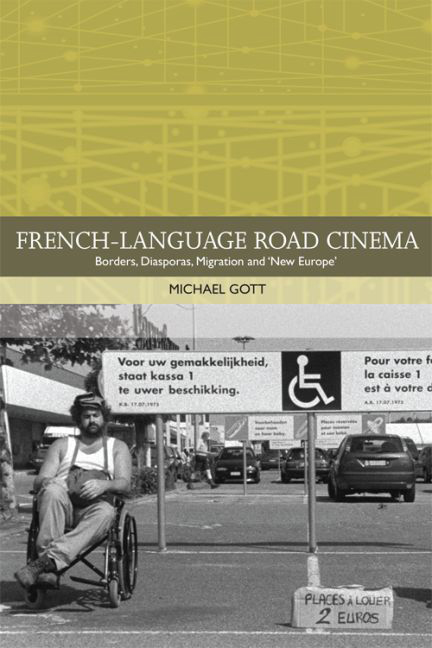Book contents
- Frontmatter
- Contents
- Acknowledgements
- List of Illustrations
- Traditions in World Cinema
- Introduction
- 1 Mapping the Hybrid European Road: French Connections, European Traditions and American Influence?
- 2 Remapping the European Road
- 3 Cowboys, Icebergs, Anarchists and Toreadors: The Paradoxes and Possibilities of the Francophone Belgian Road Cinema
- 4 Travelling Beyond the National: Mobile Citizenship and Flexible Identities in French-language Return Road Movies
- 5 The End of the Road? Dark Routes and Urban Passageways
- Conclusion
- Works Cited
- Index
1 - Mapping the Hybrid European Road: French Connections, European Traditions and American Influence?
Published online by Cambridge University Press: 12 September 2017
- Frontmatter
- Contents
- Acknowledgements
- List of Illustrations
- Traditions in World Cinema
- Introduction
- 1 Mapping the Hybrid European Road: French Connections, European Traditions and American Influence?
- 2 Remapping the European Road
- 3 Cowboys, Icebergs, Anarchists and Toreadors: The Paradoxes and Possibilities of the Francophone Belgian Road Cinema
- 4 Travelling Beyond the National: Mobile Citizenship and Flexible Identities in French-language Return Road Movies
- 5 The End of the Road? Dark Routes and Urban Passageways
- Conclusion
- Works Cited
- Index
Summary
Films covered: Il Sorpasso (Dino Risi, 1962, Italy), Le corniaud/The Sucker (Gérard Oury, 1965, France/Italy) Les petits matins/Hitch-Hike (Jacqueline Audry, 1962, France), Im Lauf der Zeit/Kings of the Road (Wim Wenders, 1977, West Germany), Leningrad Cowboys Go America (Aki Kaurismäki,1989, Finland/Sweden) and Lisbon Story (1994, Germany/Portugal)
Open spaces – perhaps deserts – and boundless horizons. Long roads redolent of burnt rubber and rock music that meet the sky at the horizon and then pursue their trajectories through landscapes peppered with wayside filling stations, scruffy diners and smoke-filled havens for road-weary lorry drivers. Assorted social outcasts, rebels and fugitives wreaking havoc, robbing, scheming and shooting their way through the country, or else fleeing the long arm of the law or evading other crooks. Adventurers in search of a better place. Iconic, high-powered automobiles from the post-war era like those that furnished what Laderman calls the road movie's ‘modernist engine’ (2002). Men in search of woman as well as escape or adventure and often – although not always – behind the wheel. Flight from the oppression of society, or at least away from the constraints of everyday domestic life and the drudgery of the workplace. For many European viewers, critics and filmmakers alike, road movies invariably evoke such images and sensations. All of the seemingly ‘American’ elements enumerated above are to be found in the European films analysed in this book. Also evident are a number of more distinctively European elements, spaces, outlooks and characters. This chapter aims to set the stage for an exploration of contemporary French-language European road movies by tracing the inter-woven lines of the tradition in its American and European iterations back to the 1960s, the period during which the template for contemporary road cinema crystallised. In the process it becomes evident that the contours of the road movie tradition sketched out in the above lines are not strictly the product of a direct lineage from seminal American films from the late 1960s such as Easy Rider (Dennis Hopper, 1969, USA) or Bonnie and Clyde (Arthur Penn, 1967, USA), but the result of complex transnational interactions within European cinemas and between European and American cultures.
- Type
- Chapter
- Information
- French-language Road CinemaBorders, Diasporas, Migration and 'New Europe', pp. 19 - 50Publisher: Edinburgh University PressPrint publication year: 2016



